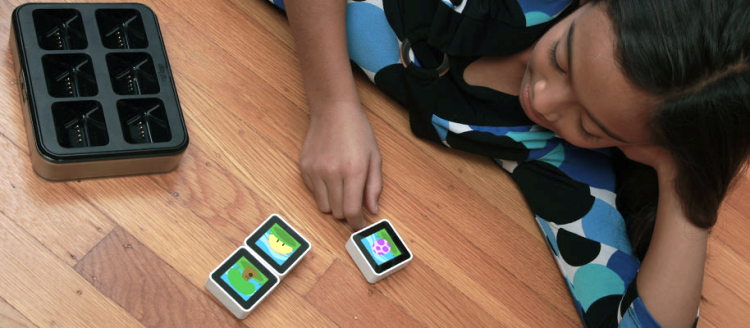Sifteo, a system of intelligent gaming cubes launched with significant fanfare in 2011, has gone open-source.
Founded in 2009 by MIT Media Lab graduates David Merrill and Jeevan Kalanithi, Sifteo set out to promote a vision of computers being ubiquitous and on every possible surface. Now, the software behind the cubes is available to anyone.
Designed to be a bit like dominos with video displays, the cubes were meant to form unique interactions when moved, tilted, rotated, or placed together.
Originally sold in sets of three for $150, the cubes were interesting and even exciting in a way, but Sifteo never took off as a commercial product. The company sold itself in July to 3D Robotics, the drone company that former Wired magazine editor-in-chief Chris Anderson founded.
“When we … started Sifteo in 2009, we knew we could deliver magical versions of everyday objects,” the company wrote in a post about the 3D Robotics acquisition, and “that we could use the latest in computing and sensors to create new interactions that were more natural, more human, and just better than what currently existed.”
Sifteo said in July that it was working on a new product and that it would continue to support the cubes until August 2015, but that it had jumped at the chance to join a company “that is redefining how we interact with and connect the digital and physical worlds — flying robots!”
But the cubes were a casualty of a market that, for whatever reason, didn’t get their utility, or at least not to the extent that could support them as a viable product. According to a GitHub post today, Sifteo has decided to open-source the cubes’ firmware, compiler, SDK, and simulator.
“From late 2011 through early 2013, a very small team of engineers did their best to create a new kind of video game system,” wrote Sifteo firmware engineer Micah Scott in the post. “It saddens us that Sifteo Cubes were not the commercial success we hoped for, but at the same time I feel very grateful that we can share some of the amazing work we did to make the product real. I hope this code brings you some amusement at least, if not some utility. … Who knows, perhaps Sifteo Cubes will live on as an Arduino shield or a swarm of remote control cars or maybe just a really esoteric Easter egg.”
VentureBeat's mission is to be a digital town square for technical decision-makers to gain knowledge about transformative enterprise technology and transact. Learn More

